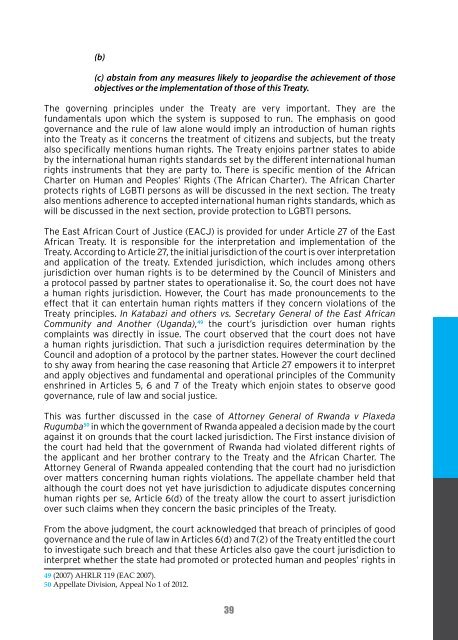PERSONS IN UGANDA
4Tks5WfQb
4Tks5WfQb
You also want an ePaper? Increase the reach of your titles
YUMPU automatically turns print PDFs into web optimized ePapers that Google loves.
(b)<br />
(c) abstain from any measures likely to jeopardise the achievement of those<br />
objectives or the implementation of those of this Treaty.<br />
The governing principles under the Treaty are very important. They are the<br />
fundamentals upon which the system is supposed to run. The emphasis on good<br />
governance and the rule of law alone would imply an introduction of human rights<br />
into the Treaty as it concerns the treatment of citizens and subjects, but the treaty<br />
also specifically mentions human rights. The Treaty enjoins partner states to abide<br />
by the international human rights standards set by the different international human<br />
rights instruments that they are party to. There is specific mention of the African<br />
Charter on Human and Peoples’ Rights (The African Charter). The African Charter<br />
protects rights of LGBTI persons as will be discussed in the next section. The treaty<br />
also mentions adherence to accepted international human rights standards, which as<br />
will be discussed in the next section, provide protection to LGBTI persons.<br />
The East African Court of Justice (EACJ) is provided for under Article 27 of the East<br />
African Treaty. It is responsible for the interpretation and implementation of the<br />
Treaty. According to Article 27, the initial jurisdiction of the court is over interpretation<br />
and application of the treaty. Extended jurisdiction, which includes among others<br />
jurisdiction over human rights is to be determined by the Council of Ministers and<br />
a protocol passed by partner states to operationalise it. So, the court does not have<br />
a human rights jurisdiction. However, the Court has made pronouncements to the<br />
effect that it can entertain human rights matters if they concern violations of the<br />
Treaty principles. In Katabazi and others vs. Secretary General of the East African<br />
Community and Another (Uganda), 49 the court’s jurisdiction over human rights<br />
complaints was directly in issue. The court observed that the court does not have<br />
a human rights jurisdiction. That such a jurisdiction requires determination by the<br />
Council and adoption of a protocol by the partner states. However the court declined<br />
to shy away from hearing the case reasoning that Article 27 empowers it to interpret<br />
and apply objectives and fundamental and operational principles of the Community<br />
enshrined in Articles 5, 6 and 7 of the Treaty which enjoin states to observe good<br />
governance, rule of law and social justice.<br />
This was further discussed in the case of Attorney General of Rwanda v Plaxeda<br />
Rugumba 50 in which the government of Rwanda appealed a decision made by the court<br />
against it on grounds that the court lacked jurisdiction. The First instance division of<br />
the court had held that the government of Rwanda had violated different rights of<br />
the applicant and her brother contrary to the Treaty and the African Charter. The<br />
Attorney General of Rwanda appealed contending that the court had no jurisdiction<br />
over matters concerning human rights violations. The appellate chamber held that<br />
although the court does not yet have jurisdiction to adjudicate disputes concerning<br />
human rights per se, Article 6(d) of the treaty allow the court to assert jurisdiction<br />
over such claims when they concern the basic principles of the Treaty.<br />
From the above judgment, the court acknowledged that breach of principles of good<br />
governance and the rule of law in Articles 6(d) and 7(2) of the Treaty entitled the court<br />
to investigate such breach and that these Articles also gave the court jurisdiction to<br />
interpret whether the state had promoted or protected human and peoples’ rights in<br />
49 (2007) AHRLR 119 (EAC 2007).<br />
50 Appellate Division, Appeal No 1 of 2012.<br />
39


